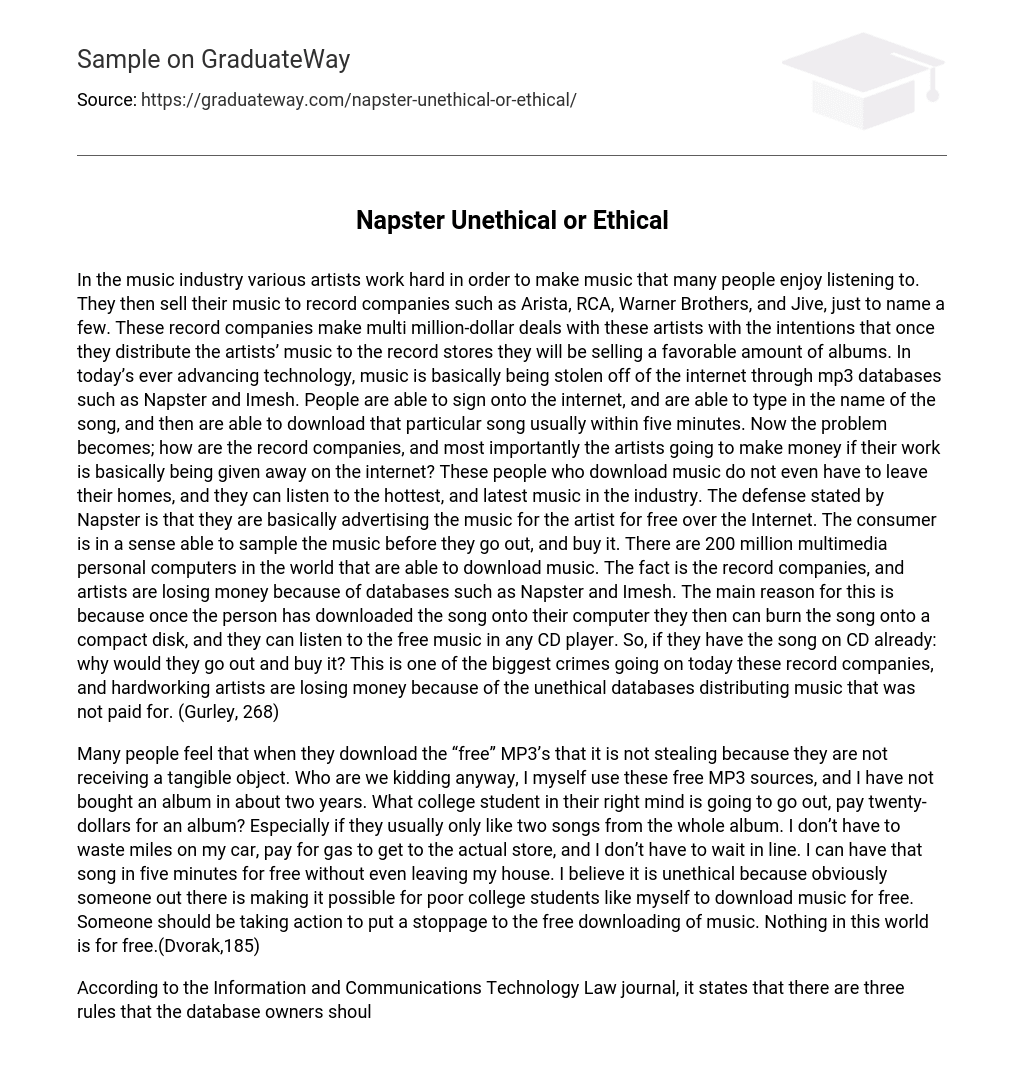Various artists in the music industry work hard to create music that appeals to a wide audience. They then sell their music to record companies like Arista, RCA, Warner Brothers, and Jive. These record companies make lucrative deals with the artists, expecting high album sales once they distribute the music to stores.
However, due to technological advancements, music can now be illegally obtained from the internet through platforms like Napster and Imesh. Users can easily search for and download specific songs within minutes without leaving their homes. This raises a significant concern – how can record companies and artists make money when their work is freely available on the internet?
Napster argues that by offering free access to artists’ music on the Internet, they are essentially advertising it and allowing consumers to sample it before deciding whether or not to purchase it. With 200 million multimedia personal computers worldwide capable of downloading music, it is evident that record companies and artists are suffering financial losses because of platforms like Napster and Imesh.
One major reason for this is that individuals can download a song onto their computer and then burn it onto a CD. This allows them to play the free music on any CD player without needing to purchase it again if they already have it on a CD. The distribution of unpaid music through databases poses a significant problem for record companies and artists, resulting in financial losses (Gurley, 268).
Many individuals argue that downloading MP3 files without charge does not constitute theft as it lacks a tangible item. I confess to utilizing these complimentary sources and refraining from purchasing albums for the past two years. It would be irrational for any university student to spend $20 on an album, particularly when they only enjoy a few songs from it. Acquiring music at no cost enables me to save money on fuel and evade the inconvenience of physical store visits and standing in queues. However, I consider this conduct unethical since it permits financially struggling college students like myself to access music without remuneration. Measures ought to be implemented to prohibit the practice of free music downloads since nothing in life is obtained without payment (Dvorak,185).
According to the Information and Communications Technology Law journal, database owners should adhere to three rules. These rules are: (1) Allowing authorized persons full access to the database, (2) Preventing unauthorized individuals from using the database, and (3) Ensuring competitors are unable to copy the database for creating competing products. It is crucial to regulate databases like Napster legally, as it makes sense to have government control. Without such regulation, musical artists would struggle financially and be unable to sustain their careers (Conley, 7).
Despite both positive and negative reactions, Napster has managed to collaborate with artists by sponsoring the upcoming summer tour of popular punk band Limp Biskit. As part of this agreement, Napster distributes the band’s music for free, while the artists earn revenue from merchandise sales such as posters and shirts associated with Limp Biskit. However, not all artists support this arrangement. Metallica and Dr. Dre, who produce their own music, have taken legal action against Napster because they view it as harmful to their careers (Kahn, 51), (Cohen, 158).
The most likely and ethical solution for databases like Napster is to collaborate with record companies. Judges have ruled that these databases have caused at least $250 million in damages to record companies. Therefore, it would be logical for these adversaries to come together to improve the music industry. The record companies can offer to sell the rights to the databases, allowing them to charge a fee for each downloaded song. This approach ensures that all parties are satisfied: artists still receive recognition, record companies can generate revenue, and artists can be compensated for the use of their music. Adapting to the changing times is essential for record companies, and government intervention is necessary to prevent databases from freely distributing intellectual property (Kahn, 52).
The ethical issue of acquiring MP3’s without payment is relevant in every aspect. In order for an economy to function effectively and remain strong, individuals must acknowledge the necessity of paying for what they receive. It is irrational to anticipate obtaining something without providing compensation as it ultimately affects someone’s financial stability. Shawn Fanning, a 19-year-old, neglected the fair distribution of songs when he created a strategy to sell advertising space on a website without involving record companies. The crucial point is that business transactions necessitate a certain level of moral ethics in order to uphold a balanced world.





